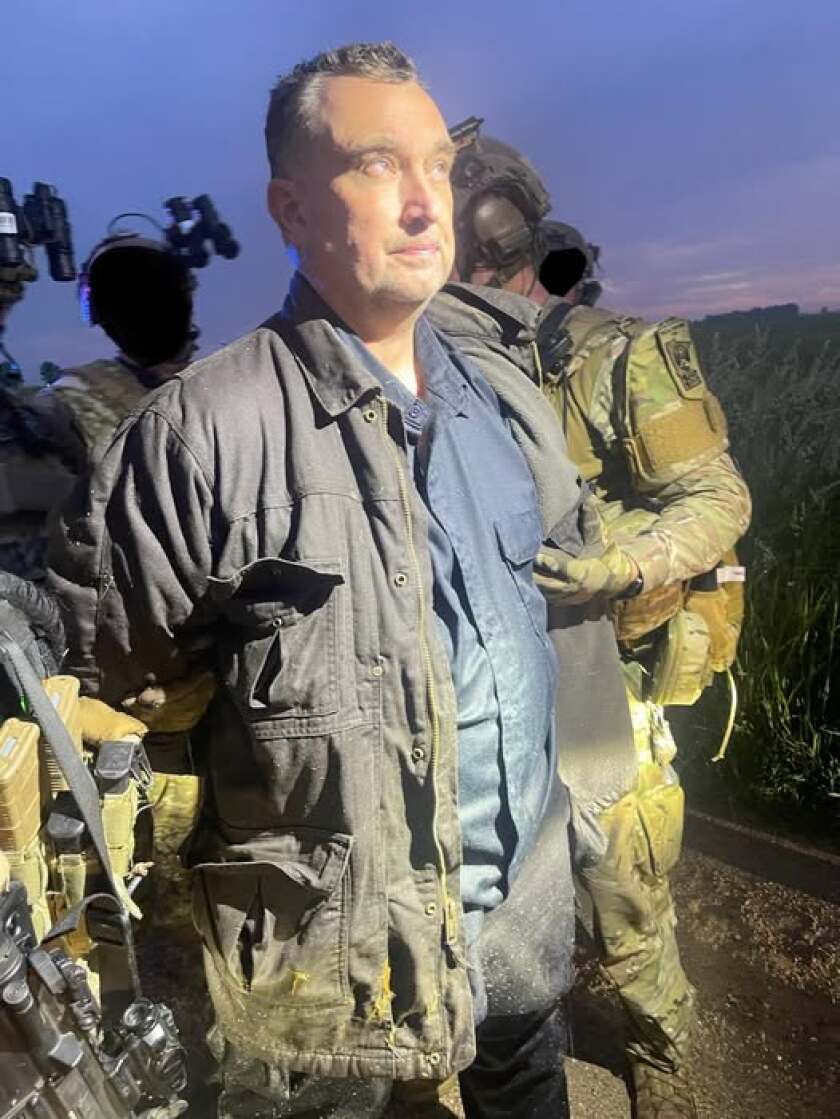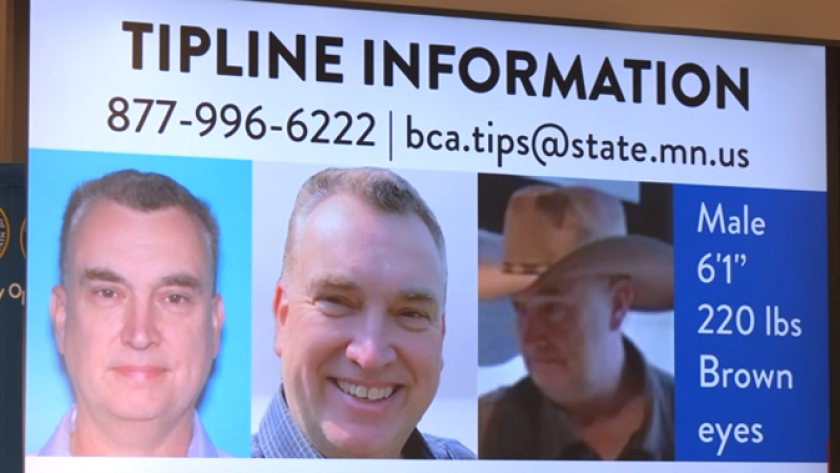ST. PAUL — A month ago, few Americans knew who Tim Walz was. But when Vice President Kamala Harris picked Minnesota’s governor as her running mate, Walz was suddenly thrust onto the national stage.
In recent weeks, news publications have raced to profile Walz and dig into his past, exposing both the positive and negative. They have not come up empty on either front.
ADVERTISEMENT
As many Minnesota voters know, Walz has proven to be a skilled politician with a knack for coming across as a down-to-earth guy.
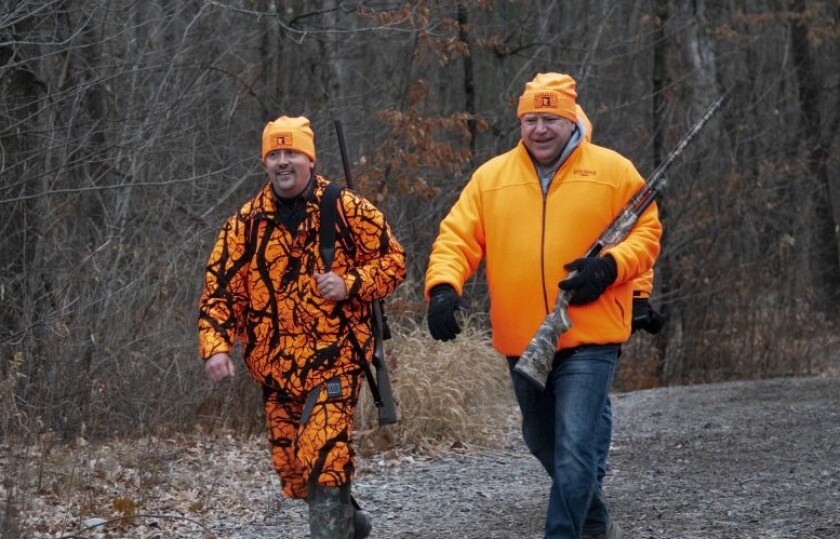
You can chalk much of that up to his life experience. Born in 1964, Walz grew up in Valentine, Nebraska, a small town with a population of about 2,600 near the South Dakota border. After high school, at 17, Walz enlisted in the Army National Guard and enrolled at Chadron (Neb.) State College, where he earned a bachelor’s degree in social science in 1989.
Upon graduation, he spent a year teaching in China before returning to accept another teaching job at a high school in Alliance, Nebraska. There, he met his wife, Gwen, who was also a teacher.
Flashing lights
While teaching in Nebraska, Walz was pulled over for speeding and then charged with drunken driving.
A State Patrol officer clocked him doing 96 mph in a 55-mph zone. After pulling him over, the trooper detected the smell of alcohol on Walz’s breath, and he was asked to perform a field sobriety test, which he failed. A subsequent lab test revealed a blood-alcohol concentration of 0.128% at a time when the state’s legal limit was 0.10%. That threshold has since been lowered to 0.08%.
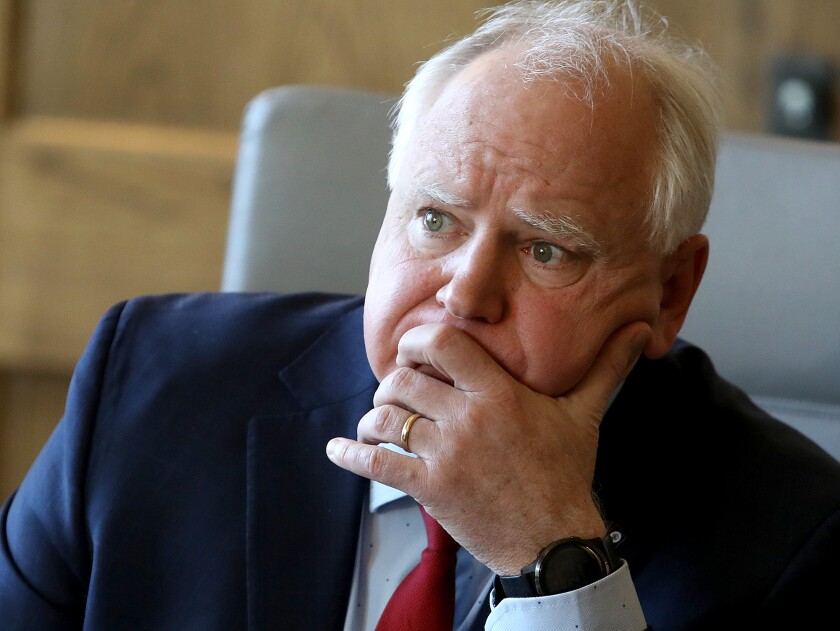
Walz pleaded guilty to a lesser reckless driving charge and was fined $200 plus court expenses.
As for Walz’s excessive speed, his attorney, Russell Harford, told the presiding judge that although it sounded “a little bizarre,” his client, who had been going about 70 mph, did not realize he was being followed by a State Patrol vehicle as it approached.
ADVERTISEMENT
According to a court transcript obtained by Minnesota Public Radio, Harford explained: “The officer didn’t turn on his red lights and he — and somebody came up real fast behind him, and he didn’t know what they were doing. So, he sped up to try to get away, fearing that somebody was after him.”
When the officer hit his lights, Walz slowed and pulled over, finally realizing that he was being tailed by a squad car.
Walz had no excuse for driving while intoxicated, however. Harford said his client felt he had let down students who looked up to him as a role model and offered to resign after his arrest. But the school’s principal talked him out of it.
As a politician, Walz has owned up to the incident and said it prompted him to quit drinking altogether.
Even though the crime occurred nearly 29 years ago, it has reemerged as a potential campaign liability.
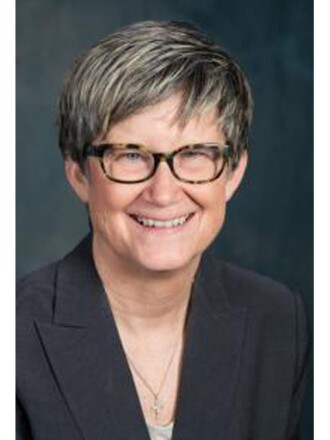
Cynthia Rugeley, head of the University of Minnesota Duluth’s political science program, suggested that if Walz attempts to minimize the arrest, it might not play well.
She suspects Walz will choose another course, potentially turning a negative into a positive.
ADVERTISEMENT
“I think he’s going to say: That incident was a turning point in my life,” Rugeley predicted. She noted that George W. Bush similarly employed an effective life-changing anecdote during his campaign about going cold-turkey sober after his 40th birthday when he woke up with a bad morning hangover.
Move to Mankato
In 1996, Tim and Gwen Walz relocated to Mankato, where he took a job teaching geography plus social studies and his wife taught English.
By all accounts, the city of 46,000 residents proved a good fit for the couple.
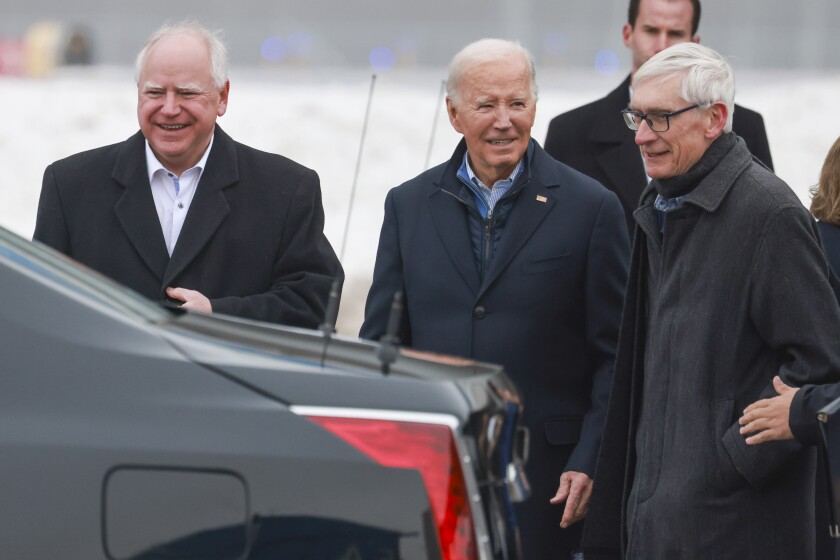
Noah Hobbs, of Duluth, grew up in Mankato. As a high school sophomore, he took a global geography class taught by “Mr. Walz,” as Mankato West students called him then.
“He just had an infectious energy that he brought to class all the time,” Hobbs recalled. “He made learning fun and accessible. And he treated all students as individuals who he met with the same level of joy you see him display today.”
Hobbs was not an academic standout, describing himself as a "C"-level student in many classes.
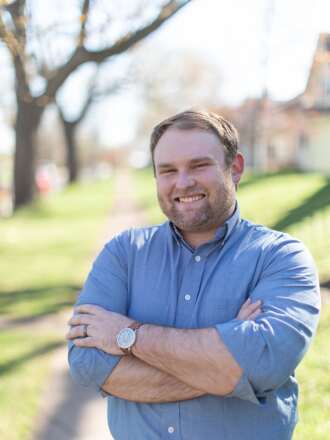
“But the fact that he took the same amount of time with me as he did with 'A' students and high academic achievers was really impactful. It meant a lot to me, and I think the world of Mr. Walz,” Hobbs said.
ADVERTISEMENT
In his junior year, Nathan Hood took a geography course from Walz and said it’s little wonder that many students refer to him as one of their favorite teachers of all time.
“He was encouraging, and he was not the kind of teacher who was going to tell kids to sit down so he could lecture them. He brought people in and got students engaged,” Hood said.
It was almost like you wanted to do well because he wanted you to do well.
He got the sense Walz genuinely cared about each student.
“Mr. Walz was one of those teachers who made you want to do well in class. It was almost like you wanted to do well because he wanted you to do well,” Hood said.
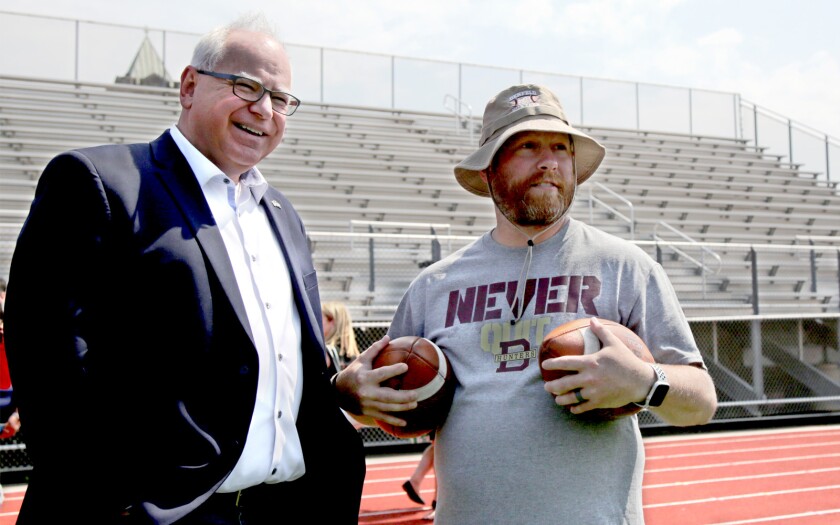
Walz also was part of the coaching team that led Mankato West to its first state football title in 1999.
Hood was not on that particular team but played as a second-string defensive tackle under Walz, who served as Mankato West’s defensive coordinator. He remembers coach Walz for his high-octane locker room speeches.
“He could really fire you up and get you excited,” recalled Hood, who sat out his senior year after breaking a foot.
ADVERTISEMENT
“He was tough as a coach,” Hood said. But while competitive, he recalled Walz always made an effort to get non-starting players, like Hood, into the game whenever the outcome did not appear to be clearly on the line.
Say something
Sherri Blasing, who now serves as Mankato West’s principal, lived next door to Tim and Gwen Walz for 20 years, until he was elected governor.
The neighboring families, both with school-age children, became fast friends and shared a garden on their property line. Blasing recalled being in the backyard with Gwen one day when she received a call informing her that her husband was being detained by the Secret Service.
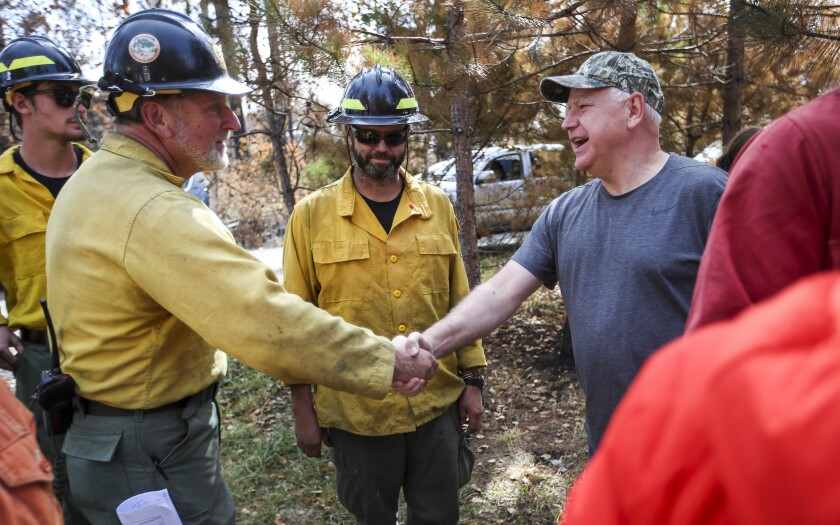
Walz had taken his class to see George W. Bush, who was making a campaign stop in Mankato, and one of the students was denied entrance because he had a John Kerry sticker on his wallet. Walz questioned why a high school student shouldn’t be allowed to see the visiting president of the United States.
Blasing said Walz used that story as a lesson to share with future students. “He’d say: 'If you see something going on that you don’t think is right, you need to get up and say something or do something about it.'"
“I think he inspired students to take on challenges and make the world a better place for everyone,” Blasing said.
ADVERTISEMENT
Walz wasn’t afraid to lead by example.
When some of West’s first openly gay students sought to form a Gay-Straight Alliance, Walz stepped forward to serve as a faculty adviser.
Blasing said that was totally in keeping with Walz’s values.
“That’s what good teachers do,” she said. “No matter what a student’s background is or who they are, every kid needs to feel valued and to have that sense of belonging.”
Military service
Walz spent 24 years in the National Guard and was promoted to serve as command sergeant major, the Army’s highest enlisted rank, by the time he retired in 2005.
New Ulm Police Chief David Borchert served five years with Walz in the same Guard unit, the 34th Infantry Division of the 125 Field Artillery Unit. At the time, Borchert was a sergeant and Walz was a first sergeant.
“He was a very good leader. Over the years, you could always count on him,” Borchert said, adding that because of his reliable follow-through when Walz said something would get done, it did.
Borchert pointed to a personal experience when he had been approved for competitive leadership training in Fort McCoy, Wisconsin, but a missing form threatened to send him home, where he would most certainly wait a year or more to be re-enrolled, postponing an anticipated promotion.
He called Walz, who assured him the needed documentation would be hand-delivered the next day, even though it involved a lot of complicated rigamarole. The paperwork arrived in time, as promised.
Borchert said Walz was particularly skilled at motivating people under his command and fortifying morale.
“Realistically, he’s probably one of the smartest guys I’ve ever served with,” Borchert said, remarking on his ability to connect and empathize with fellow soldiers.
Some have questioned the timing of Walz’s 2005 retirement. The paperwork went through just two months before his Guard unit was slated for an Iraq deployment.
But Walz said he submitted the necessary paperwork about a year in advance of the planned deployment and had reenlisted for four more years in 2001, after 20 years of service, in the wake of the 9/11 attack. Military service members qualify for full retirement benefits after 20 years.
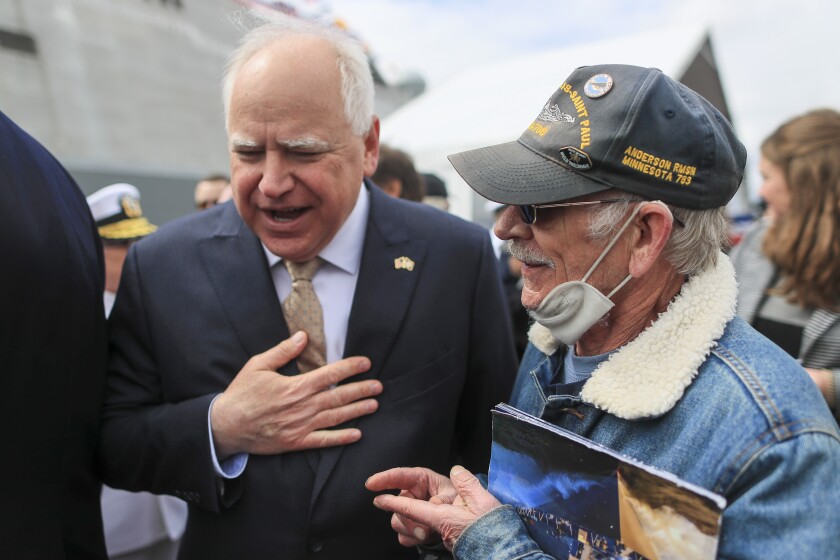
Political factors also played a role in Walz’s decision to retire, as Borchert noted.
“I don’t think anybody should ever question someone else’s military service,” Borchert said. “He served his time, and basically, he couldn’t run for Congress and be in the Guard.”
U.S. Sen. J.D. Vance, picked to run for vice president on the Republican ticket alongside former President Donald J. Trump, is a Marine veteran who recently took issue with a video posted by the Harris campaign that featured Walz explaining his support for banning domestic sales of assault weapons.
In the piece, Walz said: “We can make sure that those weapons of war, that I carried in war, is the only place where those weapons are at.”
Vance noted that Walz had never served in a combat zone and accused him of “stolen valor,” based on the video.
The Harris campaign responded with a statement: “In his 24 years of service, the Governor carried, fired and trained others to use weapons of war innumerable times. Governor Walz would never insult or undermine any American's service to this country — in fact, he thanks Sen. Vance for putting his life on the line for our country. It's the American way."
Walz was deployed from 2003-2004 in support of Operation Enduring Freedom, but he served in Italy, helping to supply troops stationed in Afghanistan.
Vance also is not a combat veteran.
The controversy has stirred emotions on both sides, as evidenced by an Aug. 8 post on X (formerly Twitter) by Jennifer Cady, a retired major from the 148th Air National Guard now serving as chair of the Duluth Chamber’s Military Affairs Committee.
She wrote: “To me, as someone who retired from military service after 20 years and was deployed overseas four times in the post-9/11 era — vet brothers who put down the service of other veterans are the worst, and doing so often says more about them than the person they are trying to one up.”
Political ambitions
Come 2006, Walz challenged incumbent Rep. Gil Gutknecht in southern Minnesota’s traditionally conservative 1st Congressional District.
Looking back, Gutknecht called the election “a perfect storm.”
He pointed to public anger directed toward George W. Bush and the war at the time as well as dissatisfaction with poor farm commodity prices.
Running as a veteran who questioned Bush’s leadership, Waltz struck a chord. As his campaign gained momentum, additional outside funds began to flow into the race.
“They were literally running attack ads against me on Saturday morning cartoon shows,” Gutknecht said.
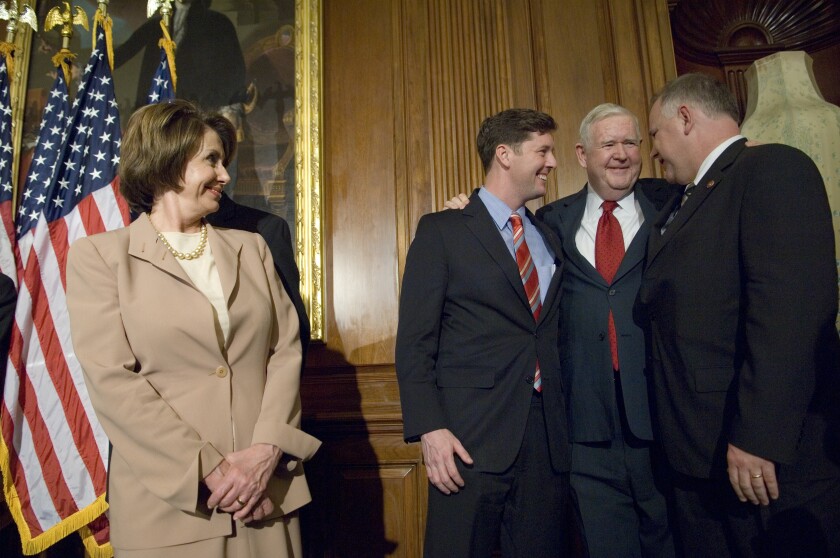
Although Walz was portrayed as a political moderate at the time, Gutknecht believes he stood further left.
“I sensed that beneath the veneer was a very liberal person. He was a teacher’s union liberal from Day 1. But that’s not the image he projected,” Gutknecht said.
Walz remained popular with his constituents, however, and went on to serve six terms in Congress before entering the governor’s race, where he again prevailed over Jeff Johnson, the Republican nominee.
Gov. Walz
During his first term as governor, Walz faced a divided Legislature. Then-Senate Majority Leader Paul Gazelka said, “I think he negotiated in good faith.”
He noted that during Walz’s first year as governor, Republicans bargained for lower taxes, yet Walz was able to garner more support for education.
From a budget standpoint, Gazelka said, “When he had someone holding him accountable as far as the money, I think it turned out all right.”
But later, when the DFL gained control of the Senate, House and governor’s office in 2023, Gazelka said the subsequent results were much different.
“When he didn’t have anyone holding him accountable, in one year they increased the Minnesota budget almost 40%. But we didn’t have checks and balances.”
Under DFL leadership, Gazelka said the Legislature took an $18 billion surplus and spent it, making future deficits a greater likelihood.
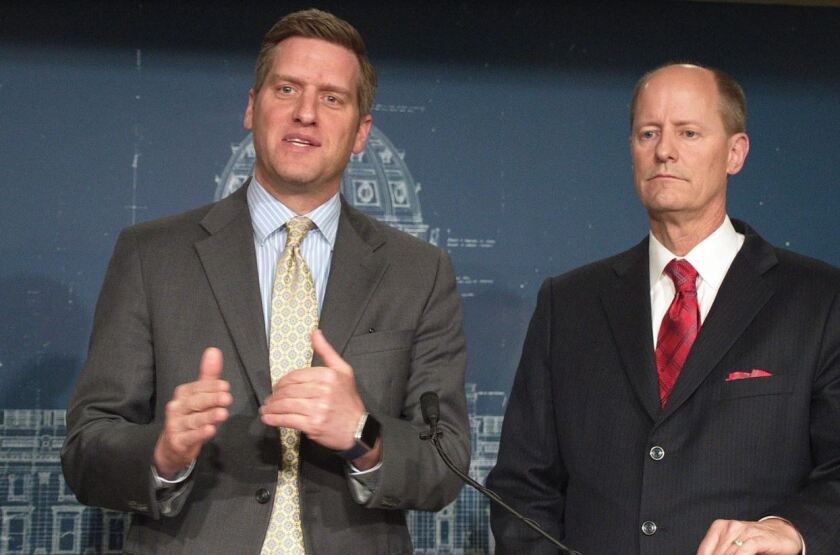
But in an opinion piece, District 8A Rep. Liz Olson, DFL-Duluth, hailed the result of the session.
“The 2023 legislative session brought wins for Minnesotans and was the result of folks making their voices heard on issues that deeply matter to them," she said.
That thin skin is his Achilles' heel.
She went on to say: “DFL lawmakers and Gov. Tim Walz worked together closely to make investments in schools, address gun violence, make significant progress in tackling climate change, enact sweeping protections for workers, cut taxes for working families and seniors, make game-changing investments in housing, protect reproductive freedom, and much more.”
“We also made robust investments in our local communities, including infrastructure and public safety,” Olson said, calling it “the most productive legislative session in generations.”
For all their political differences, Gazelka acknowledged what he called Walz’s “country charm” and referred to it as “endearing to a lot of people.”
Former House Speaker Kurt Daudt said that behind closed doors, Walz likes to talk a lot and strongly holds to his positions, although he’s not opposed to cutting deals by horse-trading when expedient.
“I’d say he’s more transactional, sort of like Sen. Gazelka,” Daudt said. “My style is more, if you ask me for something, I want it to be the right thing to do,” explaining that he personally needs to be sold on an idea before he is likely to support it.
Daudt said he and Walz have “a little bit of a love-hate relationship.”
They share a passion for vehicles, with Daudt owning a 1966 Ford Bronco and Walz driving a 1972 International Scout.
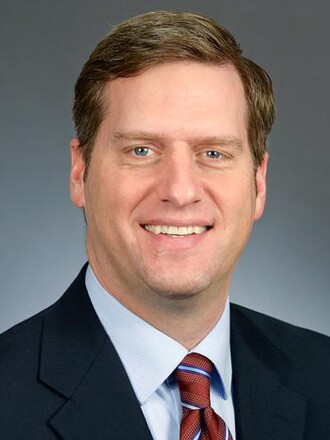
“He loves that we have that in common,” Daudt said, noting that they text one another when they see comparable vehicles for sale.
“I think he so much wants to be friends," Daudt said. "But the thing that holds him back from really being friends is: I don’t think he can get over the fact that I could be friends with him and still not like the stuff he does. He can’t be friends with someone who doesn’t agree with him or who is critical of what he does."
Daudt suggested that’s because “he believes so strongly in what he’s doing. Right?”
“That thin skin is his Achilles' heel,” he said.
Excitement and uncertainty
Hobbs said he can hardly believe his former high school teacher is in the running to become a U.S. vice president.
“It’s refreshing to have someone who is not an attorney, not independently wealthy, not a political heir or not Ivy League-educated. It’s a little bit like ‘Mr. Smith goes to Washington,'" he said.
Blasing said Walz joining the Harris ticket has excited her whole community, but it also sends an inspirational message to local students.
“If he can become a vice presidential candidate, think of what you could be. One of us is there now,” she said.

The political rhetoric will likely intensify as November approaches and much of the negative attention seems to have focused on Walz.
Professor Rugeley noted that while the vice presidential nominee is certainly a consideration, most voters are primarily motivated by the person at the top of the ticket. And if Walz continues to be the primary target of the Trump-Vance campaign, she suggested it could be to Democrats’ advantage, especially if Walz continues to come across as “a likable guy.”
“So, you don’t want to punch on him too hard,” Rugeley said.
This story originally misstated the number of terms Walz spent in Congress. It was six terms. It was updated at 6:45 p.m. Aug. 13. The News Tribune regrets the error.















